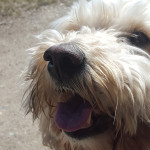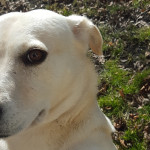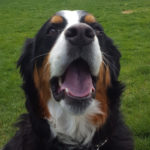Our Dog Training Philosophy
Sit. Smile. Wag.
The training philosophy here at The Sophisticated Dog is reward-based and fear-free. We are motivational trainers, based on a marker system and seek to reinforce the behaviours we want to see more of. Success in dog training requires the trainer to know what is an appropriate motivator for each individual dog in a training program. Contrary to the belief of some, dogs do not have an innate desire to please us. They are, in fact, more cooperative if they understand there is something in it for them. And can we blame them? We wouldn’t work for free either! Once we discover what motivates your dog, we use that to turn your dog into a problem solver. The dog quickly learns to get what they want from us, they have to discover what it is we want from them!
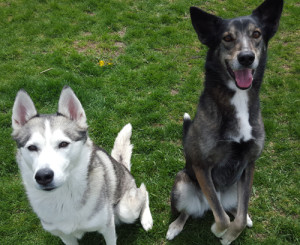
Reward-based training focuses on modifying a dog’s behaviour. We want to reward the behaviours we want to see more of by communicating to the dog that “by doing this more, good things happen.” By reinforcing the good behaviours your dog offers, we encourage the dog to offer them again and more frequently. When your dog offers behaviours you don’t want, you either ignore, withhold the reward, or direct/distract the dog into the behaviour you do want, and then reward. Reward-based training helps your dog make “good choices” and reinforces that they will make that choice again in the future. This training method is backed by modern science and current research into how the animal mind learns. It is simply the most effective training method that has ever been applied to dog training!
There are some “traditional”, out-dated training methods that are still embraced by some dog trainers and dog owners. These traditional methods have been unproven by modern 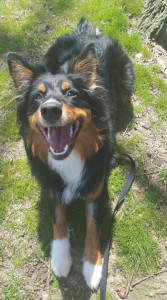 scientific research studies and have been found to harm the human-dog relationship. They can make bad behaviours worse, not better. These methods include dominance training, pack leadership training, alpha rolling your dog, the use of choke chains and prong collars, and any use of fear or punishment to get a dog to comply. These traditional training methods focus on teaching your dog to avoid something, rather than teaching the dog what to do instead. Avoidance training through the use of punishment is not as effective in communicating and bonding with your dog as rewarding and reinforcing the behaviours you do want to see more of. These outdated training methods ignore the science that has shown how the canine mind learns and how our dogs feel on an emotional level, as well as the last 20 years of wildlife biology research into wild wolves. We believe that by following modern, up-to-date, science-based dog training methods that are proven to work and take into consideration how dogs feel, we foster mutual respect between human and dog and create a better, cooperative relationship.
scientific research studies and have been found to harm the human-dog relationship. They can make bad behaviours worse, not better. These methods include dominance training, pack leadership training, alpha rolling your dog, the use of choke chains and prong collars, and any use of fear or punishment to get a dog to comply. These traditional training methods focus on teaching your dog to avoid something, rather than teaching the dog what to do instead. Avoidance training through the use of punishment is not as effective in communicating and bonding with your dog as rewarding and reinforcing the behaviours you do want to see more of. These outdated training methods ignore the science that has shown how the canine mind learns and how our dogs feel on an emotional level, as well as the last 20 years of wildlife biology research into wild wolves. We believe that by following modern, up-to-date, science-based dog training methods that are proven to work and take into consideration how dogs feel, we foster mutual respect between human and dog and create a better, cooperative relationship.
Like many dog owners, Tracy L. Wood has often found it a bit overwhelming with just how many different dog training labels and acronyms there are out there, and wonders how it is possible for the average dog owner to know if the information they are receiving about their dog is good or not. 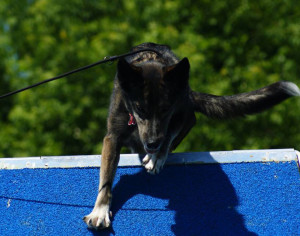 It is important that any dog training be rooted in modern science, primarily the science of how the canine mind learns and a deep understanding of canine body language to know how a dog is feeling. This should be based on the study of dogs, not wolves. We do not need to study wolves to be better dog owners because living in our homes with us are dogs, not wolves. Wolves might be dogs closest cousin but thousands of years evolution and domestication now separate them. The only true way to know if the information about dog training is good or not is to become educated yourself and to start asking questions. We welcome dog owners to ask us anything at anytime! We are always here to help you understand your dog better and dispel the myths around dog training.
It is important that any dog training be rooted in modern science, primarily the science of how the canine mind learns and a deep understanding of canine body language to know how a dog is feeling. This should be based on the study of dogs, not wolves. We do not need to study wolves to be better dog owners because living in our homes with us are dogs, not wolves. Wolves might be dogs closest cousin but thousands of years evolution and domestication now separate them. The only true way to know if the information about dog training is good or not is to become educated yourself and to start asking questions. We welcome dog owners to ask us anything at anytime! We are always here to help you understand your dog better and dispel the myths around dog training.
When choosing the right training method for you and your dog, ask yourself this question, “Do I want my dog to follow me because he chooses to do so, or because he is afraid of what will happen to him if he doesn’t?”
Please visit our Learning Center to find a list of everything from books, to blogs, to local canine care services in and around Sarnia that support and follow modern canine science practices just like we do!
